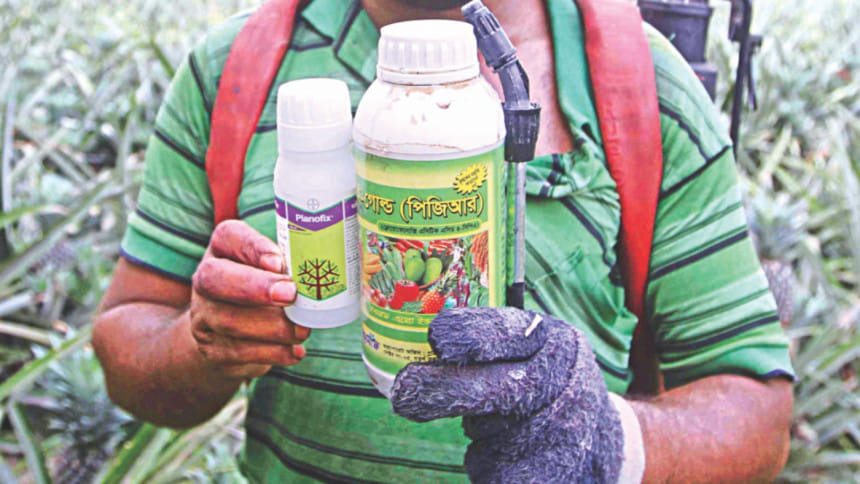Health hazards ignored for profiteering

Oblivious to potential health hazards and ruining its taste, pineapple growers are spraying hormones untimely and excessively on pineapples in Madhupur of Tangail to increase the size of the fruit.
As a result of this practice, the Madhupur variety of the fruit is also losing its natural sweet taste and aromatic flavour.
Madhupur pineapple is a rainy season fruit traditionally harvested during July and August.
About 16 years ago, the government gave the pineapple growers permission to use the hormone so that they could get yield all the year round and before the harvesting season, agricultural officials said.
Hormones are supposed to be used 15 days before and 15 days after the budding stage for better flowering of the plant and preventing the flower buds from shedding, they said.
“The local farmers, however, use hormones in an excessive amount on mature fruits to make these bigger in the hope of better profits,” said Mahmudul Hasan, Madhupur upazila agriculture officer.
“Some dishonest pesticides shop owners encourage farmers to use these hormones on the fruits, untimely and excessively, to increase the sale of their chemical and earn a profit from it,” he said.
“Using excessive hormone on the fruit makes it tasteless and watery,” he added.

Some pineapple growers in Madhupur, however, said they use hormones on the fruit as buyers prefer big and yellow pineapples to the natural-sized ones. The growers thus can charge a higher price for the bigger fruits.
A normal-sized pineapple sells for Tk 15-20, while a bigger and more yellow pineapple for Tk 20-30.
“We use the hormones on local pesticides shop owners' instructions because we don't know about the proper use of the hormone," said Sumon Miah, a pineapple grower at Mohishmara village.
Farmer Yusuf Ali of Digholbaid village said all the pineapples of an orchard are not ripe at the same time.
“About 10 to 12 fruits are ripe at a time, and taking a few pineapples to the market for sale every time is not profitable," he said.
Spraying the hormones on the mature fruits before harvesting helps ripen all the fruits of an orchard together, he added.
Abdul Aziz Company, a pesticides shop owner at Garo Bazar of Madhupur, said, "As the local agricultural officials are not available to the farmers, they come to us for suggestions about using hormones.”
Using hormone during budding stage cannot be much harmful as its effect does not last for many days. But if the hormone is used on the mature fruits, its effect may linger, said Abdul.
Agricultural officials have echoed the same.
Though it is written on the bottles containing the hormones that these are not harmful to human health, physicians have mentioned that consuming the chemically-treated fruits may cause diseases.
“Regular consumption of hormone-treated fruits can cause different diseases of kidney and liver,” said Khan Mohammad Saiduzzaman, consultant of medicine at Tangail Medical College Hospital.
According to the Agricultural Extension Department in Tangail, pineapple is cultivated on about 10,000 hectares in Madhupur and adjacent areas and over one lakh tonnes are produced a year.
SM Shahid, Madhupur upazila unit vice-president of Sachetan Nagorik Committee, urged the local agriculture department to conduct more research on pineapple and its cultivation and motivate the farmers to grow the fruit without hormones.
The department should also engage farmers and agriculture officials, who have years of experience in pineapple farming, in this awareness campaign, he added.
Abul Hasim, deputy director of the Agricultural Extension Department in Tangail, said the department along with the district administration has been holding different programmes to create awareness among the pineapple growers.
“The local farmers are also becoming conscious of the issue, and we hope to bring down the excessive use of hormones in the next two to three years. We may be able to export the fruits to foreign countries then,” he added.

 For all latest news, follow The Daily Star's Google News channel.
For all latest news, follow The Daily Star's Google News channel. 








Comments